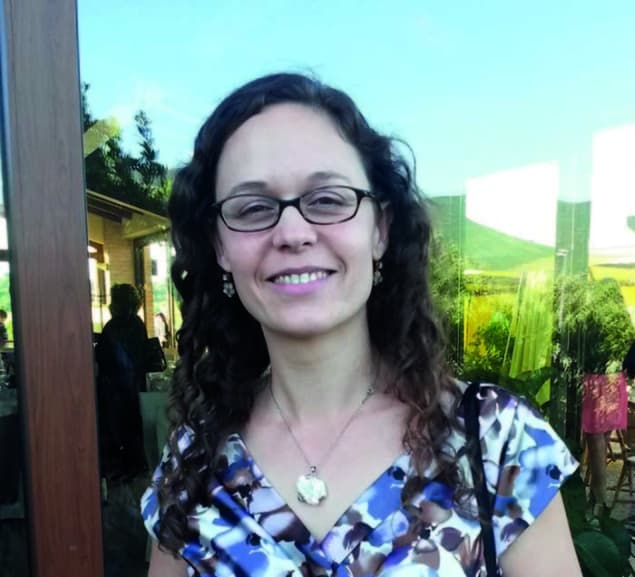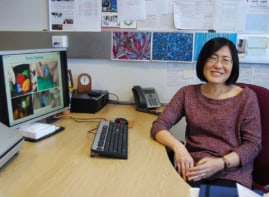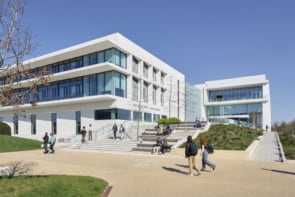Lydia Harriss is head of physical sciences at the UK’s Parliamentary Office of Science and Technology, which provides independent advice on science, technology and social science topics to MPs and peers.

What sparked your interest in physics?
I became fascinated in particle physics and cosmology after watching the 1993 Royal Institution Christmas Lectures – The Cosmic Onion, presented by Frank Close – which was a little window onto a new and mysterious world. Spurred on by one particularly enthusiastic aunt (she’ll proudly tell you she’s one of the few people to have ordered Feynman’s essays out of the stacks at the local library) and several supportive teachers, I decided that I wanted to understand the universe and to perhaps find some greater meaning along the way. Many years later, I found myself at the filming of another Royal Institution Christmas Lecture, while working as a science writer for the Wellcome Trust. I sat surrounded by 400 kids, all buzzing at the prospect of being on TV, and I hoped that some of them were embarking on their own journeys into science.
Did you ever consider an academic career?
Yes, definitely. It was one of the career options that I was seriously considering when I began my PhD in biophysics at the University of Oxford. I had enjoyed the research that I had done as a physics undergraduate at the University of Bristol and wanted to continue studying. I was very interested in science communication by that point too, and decided that doing a PhD would still be useful experience if I decided to go down that route. The skills that you learn and the qualities that you have to demonstrate during a PhD are applicable in many walks of life – things like independence, problem solving and of course tenacity!
How did you get interested in working as a scientific adviser for the UK government and helping to shape policy?
Many people don’t realize this, but the UK government and parliament are actually very separate organizations. Parliament scrutinizes government and holds it to account, as well as debating the legislation that the government proposes and deciding whether it should be become law. My team – the Parliamentary Office of Science and Technology (POST) – is part of the administration that supports parliament (kind of like parliament’s equivalent of the civil service).
I became aware of POST during my PhD, when I heard about the fellowships that POST runs (three-month policy internships for PhD students). Providing advice to MPs and peers about science is a unique intersection between science and communication. Unlike many policy organizations that are involved in lobbying, POST isn’t trying to promote an agenda, it just presents the research evidence and the range of stakeholder opinions on a topic. Plus, there’s the opportunity to have a real impact.
When the physical-sciences adviser role came up at POST, I jumped at the chance. It’s turned out to be far more varied and exciting than I had imagined. Day-to-day work involves researching and writing briefings, recruiting and supervising our PhD fellows, organizing events, supporting the parliamentary select committees and answering seemingly endless e-mails. Top moments include visiting CERN, discussing science advice with senior politicians at the UK embassy in Buenos Aires, organizing receptions with speakers such as Peter Higgs and Tim Berners-Lee, and having one of my briefings complemented in a parliamentary debate.
What are some of the challenges in working for POST?
POST’s physical sciences and computing section covers a huge range of subjects. Over the past few years I’ve worked on quantum technologies, digital forensics, robotics and autonomous systems, telecoms, and railway signalling. The breadth of subjects can be challenging, as it usually extends well beyond the subjects that I studied during either of my degrees. It means that I need to be able to get up to speed quickly on a new subject area and be able to write and speak with authority about it, while making it accessible. The flip side of this is that I’m continuing to learn about unfamiliar areas of science, often helped by speaking to academics and others who are the real experts in an area, which is actually one of the great pleasures of the job.
There are always more things on my “to do” list than I have time for, but I’m sure I’m not the only one who could say that about their job. Timing is another challenge. It usually takes at least three months to produce our standard “POSTnote” briefings, as they involve conducting lots of interviews and several stages of peer review. This means that we often need to identify topics that will be of interest to parliament ahead of them hitting the parliamentary agenda. This is definitely one of the challenges of the job, but very satisfying when you get it right!
What are you working on now?
I’m currently supervising one of our PhD fellows, who is writing a briefing on the fire safety of building materials. There’s understandably been lots of interest in this since the fire at Grenfell Tower in London, and this briefing will help parliamentarians to understand some of the technical aspects of the topic. I’ve been guiding my fellow’s research, checking that she’s speaking to the right people and asking the right questions, and doing lots of editing.
The House of Commons’ Digital, Culture, Media and Sport Select Committee has also been keeping me busy, as I’ve been supporting its inquiry into fake news by drafting briefings and identifying potential witnesses. I’m also scoping out potential topics for future briefings. Brexit is an important focus as it has potential implications for aspects of many of the subjects that we cover, from the role that the Euratom Treaty currently plays in regulating the UK’s civilian nuclear activities to potential changes in farming practices post-Brexit.
How has your physics background been helpful in your work, if at all?
It certainly helped me to get my current job! My physics background has been useful for helping me to interpret technical information, whether I’m reading academic literature or speaking to researchers. My physics knowledge has been directly relevant to some of the subjects I’ve covered, for example the briefing that we did on quantum technologies. I think it also makes it easier for the experts that I’m speaking to, if they know that they don’t have to go back to absolute basics when they’re explaining something. My PhD has given me an understanding of research and the scientific process, which can be important for appreciating the value and limitations of scientific evidence. There’s also been the odd occasion where I’ve walked into an event full of professors, sirs, lords and baronesses, and have been secretly glad of the “Dr” in my own name.
Any advice for today’s students?
Don’t worry too much if you don’t have a long-term plan. I spent years trying to decide what I wanted to be when I grew up, and feeling faintly jealous of friends who knew that they wanted to be doctors or lawyers. It’s been a slow process of trying a few different things out, working out my strengths, weaknesses, and what I do and don’t enjoy doing. In the end, I was able to recognize a great job opportunity when I saw it and had fortunately picked up enough experience along the way (through volunteering etc) to land it. I’m reluctant to admit to being fully grown-up yet, but I have at least found my way into a job that I love (most of the time), that I didn’t even know existed when I was at school. With the rapid changes in technology that we’re likely to see over the next few years, I suspect that some of the most exciting jobs of the future don’t even exist yet, while some of the jobs on offer today may change dramatically or even be lost altogether.



